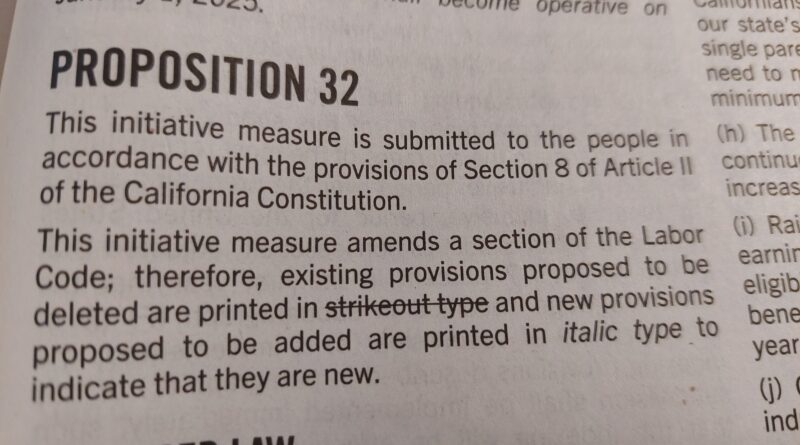Prop 32: Raising the minimum wage to $18 per hour
California voters will face a major decision as 2024 ends with Proposition 32, which proposes raising the state’s minimum wage to $18 per hour by 2026 and adding inflation adjustments. Supporters argue this will uplift low-wage workers, while opponents fear inflation and a potential burden on small businesses.
“I generally like the idea of raising the minimum wage,” according to David Roth-Rossi, an economics teacher at CVHS, pointing out that the benefits of increased consumer spending often outweigh the costs. Rossi referred to the recent fast-food wage increase to $20, noting, “Employment has not dropped,” and prices rose minimally. This supports the argument that raising wages can stimulate economic activity, as minimum-wage workers tend to spend their income locally.
One controversial aspect of Proposition 32 is automatic wage adjustments tied to inflation. Rossi highlighted the risks of a “spiral effect” where rising wages further fuel inflation, making it difficult to control. “If inflation goes up like crazy, automatically raising wages with it can continue the cycle of inflation,” he explained, raising concerns about timing such increases in inflationary periods.
In the Bay Area, inflation is already a significant concern, especially with the cost of living skyrocketing over recent years. Housing costs, gas prices, and basic necessities have soared, and many residents worry that further wage increases could compound these issues. Bay Area residents are particularly sensitive to the possibility that Proposition 32’s automatic inflation adjustments could drive prices even higher.
As Rossi pointed out, “When inflation is already high, raising wages can add fuel to the fire,” which resonates with fears already present in one of the nation’s most expensive regions. Residents fear that businesses might increase prices further to accommodate rising wage costs, making it even harder for average consumers to afford basic goods and services.
Smaller businesses may feel the impact more sharply. Rossi noted that businesses with fewer resources might struggle to absorb higher wages or automate tasks. “It’s harder for them to keep up with the higher wages,” said Rossi, suggesting that large corporations, which can afford automation, may be less affected.
For workers like Sa Ri Ngalula, a senior at CVHS who works as a caregiver while balancing her studies, Proposition 32 represents an opportunity for greater financial stability, especially for young workers. “I agree because when the wage increases, it could give workers more of an opportunity to pay off other bills and provide more stability in housing and food,” Ngalula said. She added that higher wages could set an expectation for both small and large corporations to be more accountable in how they treat workers and adjust to price changes more responsibly.
Proposition 32 brings both opportunities and risks. While it could elevate low-wage workers and stimulate the economy, concerns over inflation and the impact on small businesses remain critical. Bay Area residents, already struggling with high inflation, are particularly worried about price hikes if Proposition 32 passes. But as Rossi observed, “The benefits often outweigh the costs, but caution is needed when inflation is a factor.”

